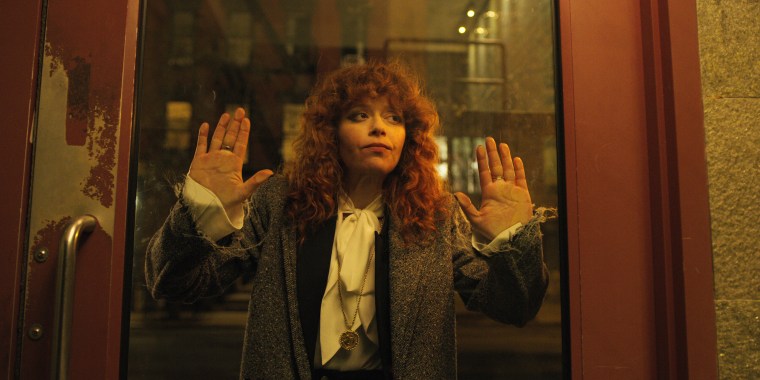Most people don’t think too hard about souvenirs. But in Netflix’s excellent new show “Russian Doll,” the symbol of the Russian nesting doll is a brilliant metaphor for the creeping sense of disillusionment that starts to happen to many adults in their mid-30s — the idea that it’s almost impossible to break out of the life we’ve settled into, no matter how hard we try. The eight-part series starts out as the blackest of comedies, lead by the brilliant Natasha Lyonne (most recently of “Orange is the New Black”). But the deeper into its layers the show goes, the more profound the story becomes.
Lyonne (who also helped direct the series with Leslye Headland) plays Nadia Vulvokov, a loud New Yorker artist type, the kind who’s had enough success that others throw her birthday parties on their own dime in their million-dollar penthouses in Alphabet City. But even though she’s surrounded by her best friends, our heroine is quickly established as a loner, someone who has no interest in long-term relationships with anyone. Even her cat lives part-time at the neighborhood bodega. (They like to keep things open-ended.) Written with dark humor by Headland and Amy Poehler, the show starts out as a parody of New York's Lower East Side lifestyle.
And then Nadia dies.
This is not a spoiler, it happens early in the first episode, which only runs 30 minutes. In fact, Nadia dying is the point.
This is not a spoiler, it happens early in the first episode, which only runs 30 minutes. In fact, Nadia dying is the point, because she doesn’t stay that way. Her death causes something in the universe to trigger a new beginning. Out of nowhere, Nadia finds herself, impossibly, going from underneath the tires of a cab back into the bathroom at the party. Is it a bad acid trip? Is it a dream? Nadia doesn’t have a lot of time to find out because boom, she’s soon dead again. In fact, it doesn’t seem to matter what she does — all decisions lead eventually to death, whether falling down a flight of stairs at the party or flipping over an open sidewalk cellar door. (It should be noted that Lyonne perishes in a series of quintessentially New York City scenarios.) Forget a million ways to die in the West, 90 ways to die in New York brings out Headland and Poehler’s macabre creative sides.
SIGN UP FOR THE THINK WEEKLY NEWSLETTER HERE
Considering “Russian Doll” was released by Netflix on February 1, it’s inevitable this series will be compared to “Groundhog Day,” albeit a more bloodthirsty version. But this is incorrect. As Nadia herself notes, a better comparison is “The Game” starring Michael Douglas. Vulvokov is a game developer, and her life starts to feel like a particularly hard puzzle sequence. Want to avoid getting hit by a cab? Try taking the stairs to exit the party. The stairs turned out to be a death trap? Get in the elevator.
Death is not the finale, it’s a reset that sends the player back to the last save point. The characters and ending are the same, only the circumstances change. Before the night is over, Nadia is sent back to the bathroom, trying to figure out what combination of events will allow her to wake up tomorrow, alive.
Netflix’s “Black Mirror: Bandersnatch,” which premiered at the end of December, told the story of a game programmer who the audience controlled. The interactive concept was interesting, but as a story it was intensely unsatisfying. “Russian Doll” digs into the same material, but with a far more effective premise. Here once again is someone who spends their life programming video game sequences, only to find themselves trapped in a time loop that can’t be beat.
Unlike in “Bandersnatch,” though, “Russian Doll’s” linear story allows the themes to hit harder. And while other recent releases have focused on video games as metaphors for surviving in the real world, “Russian Doll” never takes itself too seriously. How can it, when its main character can’t even eat takeout from the deli without unglamorously choking to death?
Lyonne, Headland, and Poehler make a great if very dark comedy team, but the series isn’t all laughs all the time. Though the gaming metaphor continues through all eight episodes, other themes creep in around the edges, including how hard it is to change old habits.
Fans of TV puzzles will likely appreciate Nadia’s hunt for clues — and a big mid-season twist. But some of the most interesting scenes involve the supporting characters. The level of character development and agency the side characters have is remarkable. No one, not even the stereotypical girlfriend or stereotypical mother figure are merely foils for the leads. And all of them are just as unable to break out of their own loops.
All humans in this story struggle with change, even if that means making the same mistakes multiple times. Nadia may be fighting to find her way out, but all her New York City habits and the person she grew up to be keep pulling her back in. After all, no matter where you go, there you are.

